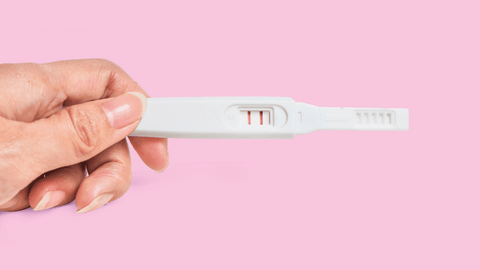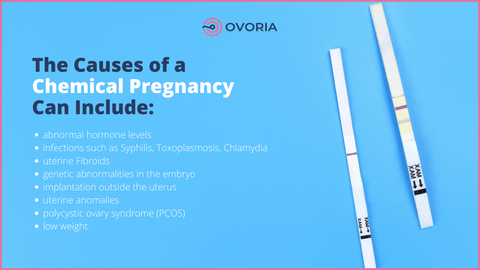Chemical Pregnancy: Symptoms, Causes and Treatment
There are many factors that have an impact on successful pregnancy. However, sometimes a woman becomes pregnant and pregnancy loss occurs shortly after implantation of the embryo. This early pregnancy loss is called a chemical pregnancy or sometimes a biochemical pregnancy.

What Is a Chemical Pregnancy?
A chemical pregnancy means a miscarriage that occurs shortly (usually it happens before or after the fifth week) after a positive pregnancy test. Nearly 50-70% of miscarriages are due to chemical pregnancies. A chemical pregnancy can be identified by bleeding around the time of a regular period. In the first trimester, the fetus is too small for an ultrasound to detect any chromosomal abnormalities.
A chemical pregnancy occurs when a woman has a positive pregnancy test, but it turns out not to be a viable pregnancy. If a woman has a positive pregnancy test and her fertility specialist finds levels of hCG in the blood, she probably had a chemical pregnancy. Many women often don't even know about the term "chemical pregnancy" and as a result, don't understand that they were pregnant. Despite what the term may sound like, it isn't a false positive pregnancy test, but rather an early pregnancy loss.
Signs of Chemical Pregnancy
If a woman has had an early miscarriage, it may go unnoticed unless she got a positive pregnancy result. Other signs of a chemical pregnancy are:
- A positive result of pregnancy test
- Low levels of HCG hormone (pregnancy hormone) on a blood test
- Delay in their periods, particularly in the case when they have regular periods.
- Menstrual bleeding after testing positive for pregnancy
- Passing more clots
- Delay in the menstrual cycle
- Mild abdominal cramping
If a woman experiences any of the following symptoms, she must contact her doctor to get professional medical advice
What Causes Chemical Pregnancy?
In most cases, chemical pregnancy can happen because the fertilized egg had a type of chromosomal anomaly that made it non-feasible from an early stage pregnancy. If pregnancy isn't established, there's a chance that an egg will be fertilised and implant itself into the lining of the uterus. This usually occurs about seven days after your period is expected. A few days after ovulation, this fertilised egg implants itself in the wall of the uterus. When you become pregnant, the HCG hormone starts flowing, which is produced by the pregnancy cells and developing placental tissues. However, in the case of a chemical pregnancy (which means your hCG hormones go down instead of up), a woman will have a very early miscarriage.
The causes of a chemical pregnancy can include:
- Abnormal hormone levels
- Infections such as Syphilis, Toxoplasmosis, Chlamydia
- Uterine Fibroids
- Genetic abnormalities in the embryo
- Implantation outside the uterus
- Uterine anomalies
- Polycystic ovary syndrome (PCOS)
- Low weight
- Diabetes
- Age

What Are the Risk Factors?
The following risk factors result in a higher chance of experiencing pregnancy loss:
- Such medical conditions as diabetes, PCOS, uterine fibroids
- Advanced maternal age
- Untreated thyroid conditions
Treatment For a Chemical Pregnancy
If a woman has a chemical pregnancy, it doesn't mean that she can't get pregnant and give birth naturally. There isn't a treatment for this sort of pregnancy failure, but there are alternatives that will help to get pregnant. A doctor might recommend a couple to do tests and screening to get done to evaluate medical condition which is conducive to miscarriage. If your doctor can identify and treat the exact cause, it can decrease the probability of another chemical pregnancy. The doctor would also look for a treatable condition like an abnormality in the uterus or some infection. The medications and treatment methods that usually work include:
- Baby aspirin medicine
- Antibiotics to help beat infections
- Progesterone in case of the luteal phase defect
A chemical pregnancy isn’t the only reason that makes the body produce pregnancy hormones. Significant amounts of HCG can be detected with an ectopic pregnancy too.
Chemical Pregnancy and IVF
Even if the pregnancy was very short or non-existent, it can be emotionally painful for the woman. But a chemical pregnancy doesn't mean she can't have a healthy pregnancy in the future. It is very important to recognize the reason for the chemical pregnancy to get the required treatment. If a woman has had multiple chemical pregnancies and hasn't treated the problem, she may not be able to have a baby because of her growing age. Then getting fertility treatment is recommended.
In Vitro Fertilization can be recommended in cases of:
- Uterine fibroids
- Endometriosis
- Blocked fallopian tubes
- Premature ovarian failure
During the procedure of IVF, pregnancy tests are done 9-14 days after in vitro fertilization to check for pregnancy. An HCG blood test will come positive if embryo implants have occurred, that is if the embryo has attached itself to the uterine lining. However, there are abnormalities in the embryos that may cause very early pregnancy losses shortly after implantation. It's true that miscarriage after a chemical pregnancy can be heartbreaking. However, it also indicates that a woman is ready to get pregnant again. And another IVF attempt may bring a healthy pregnancy.

